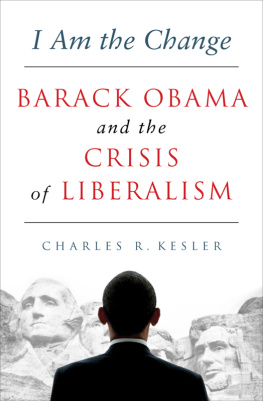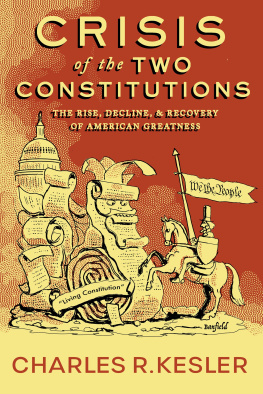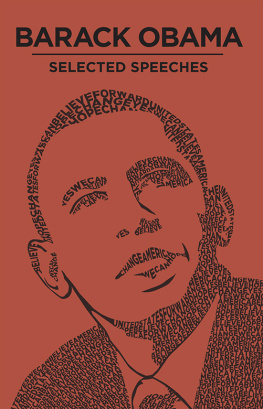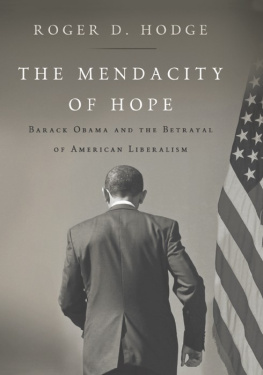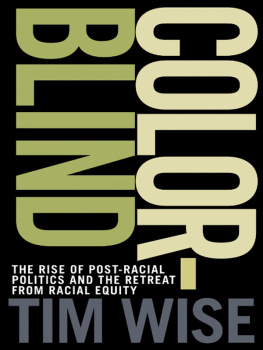
I AM THE
CHANGE
Barack Obama and the Crisis of Liberalism
Charles R. Kesler

T O THE M EMORY OF W ILLIAM F. B UCKLEY , J R .
Contents
B arack Obama had the distinction of being the most liberal member of the United States Senate when he ran for president in 2008. The title had been conferred by National Journal , an inside-the-beltway watchdog that annually assigns senators (and congressmen) an ideological rank based on their votes on economic, social, and foreign policy issues. Obama was more liberal than the Senates independent socialist, Bernie Sanders, considerably more liberal than Barbara Boxer or Harry Reid, and dramatically to the left of his opponent in the primaries, Hillary Clinton. It was only one ranking, but it captured something important. He was much more liberal than his presidential campaign let on.
Since then, we have learned a lot more about his political leanings as a young man, which were fashionably leftist, broadly in keeping with the climate of opinion on the campuses where he found himselfOccidental College, Columbia University, Harvard Law School. As a senior at Columbia, he attended the 1983 Socialist Scholars Conference, sponsored by the Democratic Socialists of America. It met in Manhattan at the Cooper Union, site of one of Abraham Lincolns major speeches, but this conference commemorated not the Great Emancipator but Karl Marx, on the centenary of his death. Though a meeting of democratic socialists and, yes, community organizers, the conference as well as his long-running friendships with radicals of various sorts would have drawn more sustained attention if the Cold War were still raging. But it was not, and Obama pleaded youthful indiscretion and drift; and of course his campaign did its best to keep the details from coming out. He still had to answer, in some measure, for his ties to William Ayers and Jeremiah Wright, but the issue with, say, the good Reverend concerned his sermons about race and Middle East politics, not his penchant for visiting and honoring Fidel Castro, not to mention the Marxist Sandinistas in Nicaragua. Partly by avoiding the worst of the old anti-Communist gantlet, Obama became the most left-wing liberal to be elected to national executive office since Henry Wallace.
Still, the President is not a self-proclaimed socialistnor like Wallace, a self-deceived fellow traveler or worse. Obama never went so far, so openlywhether out of inertia, political calculation, or good senseand therefore never had to make a public apostasy. As a result, we know less about his evolving views than we might like, though probably more than he would like. He calls himself a progressive or liberal, and we should take him at his word, at least until we encounter a fatal contradiction. Thats only reasonable and fair; and it avoids the desperate shortcut, gratifying as it may be, of unmasking him astake your picka third-world daddys boy, Alinskyist agitator, deep-cover Muslim, or undocumented alien. Conservatives, of all people, should know to beware instant gratification, especially when it comes wrapped in a conspiracy theory. In any case, hypocrisy, as Rochefoucauld wrote, is the tribute that vice pays to virtue, and Obama seems to think it would be a virtuous thing to have been a lifelong liberal, even if he wasnt. And so the question arises: what does it mean anymore to be a liberal?
This book is about Barack Obama and his place in modern American liberalism. It approaches liberalism as he sees it, as a form of progressivism, which is more or less how its greatest twentieth-century champions understood it, too. (Capital-P Progressivism hereafter refers to the movement that arose in the first two decades of the past century; small-p progressivism to the more general belief in an inevitably glorious, man-made future. Progressivism was progressivist; but not every form of progressivism, e.g., Marxism, was compatible with Progressivism.) Neither a biography of Obama nor a history of liberalism, this volume focuses on liberalisms essencewhat it is, where it came from, where its goingand how the president sees himself in that picture. Foreign policy, as such, figures very little here, not because liberals dont have interesting and highly untraditional views on the subject but because their views of domestic policy, and particularly of the grounds and purposes of political life, are more fundamental. For similar reasons, we dont consider the broader American Left, spanning labor unions, social reform movements, the Socialist and Communist parties, and the like, but confine ourselves to the main political and intellectual developments and the most prominent and ambitious political leadersthe great men of the age, as Woodrow Wilson might put it. Doubtless John F. Kennedy is more beloved than LBJ, but he doesnt hold a candle to the uncouth Texan in terms of building the modern welfare state and fulfilling the civil rights agenda. Trumans achievements are mostly in foreign policy, and many of them, like launching American participation in the Cold War, reek too much of the Vietnam War for contemporary liberal tastes. Bill Clinton, well, has his own problems. Ditto Jimmy Carter, though not the same ones.
When liberals tell their own story, they emphasize the unplanned, improvisational character of what came to be called liberalism. As Eric Alterman, a professor of English and journalism who likes to write books defending liberalism, declares, liberalism arose as a matter of pure pragmatism with next to no theory in the first place and was led by a politician [FDR] who prided himself on his willingness to try almost anything.... This argument, repeated in countless mainstream histories, presupposes that socioeconomic change is the driving force, and that politics, at least good, liberal politics, is a kind of reactionan adjustment of governing institutions and policies to the changing realities of society. Liberalism comes across as defensive and modest, in fact downright conservative, but also inevitable. Political change cant lag behind social change for long, and what liberals do is simply mind the gap: they prescribe the minimal adjustments necessary to keep the social organism healthy and whole. The story has the advantage of de-radicalizing liberalism, and of distracting attention from its actual ideas and from their role in its real genesis and growth. Its the equivalent of the policeman saying, Move along, folks, theres nothing to see here. Keep moving.... The same liberals who push this pragmatic account invariably speak at the same time of their movements ideals or vision, revealing that liberalism as conservative adjustment cannot be the whole truth. In fact, both arguments, for liberalism as slow change and for liberalism as the hope of idealistic or radical transformation, were originally made by the same man, Woodrow Wilson, when he helped to found modern American liberalism. Franklin Roosevelt was a young man then, a Wilsonian progressive serving in his leaders administration.
Wilson thought the modest story about liberalism partly true, but partly a noble lie to cover the remarkably thorough break he intended to make from the original, and still more or less prevailing, interpretation of the principles of American politics. The cover-up was thus coeval with the crime, you might say. Without dismissing the liberal gift for moderation and capacity for compromise, this book will shine a light on the peculiar radicalism inherent in American liberalism ever since its origins in the Progressive movement. Liberalism was a choice, not a destiny, and in its rise to power ideas, not material conditions, were in the forefront. Its foundational ideas, as we say today (alas), when seen in broad daylight, point up the connections between the several installments of liberal reform, as envisioned and explained by the leading liberal reformers themselves. Pay no attention to the man behind the curtain, commands the Wizard of Oz. In this case, however, the famous liberal statesmen are well in front of the curtain, exposed as only presidents can be, and their ideas and their reasoning are open to anyone who knows how to read. Our method, accordingly, is to let these renowned liberals speak for themselves as much as possible. We stick as closely as we can to their own words from their speeches, books, and letters. We try to understand them as they understood themselves, before criticizing or evaluating themthough this book, written by a conservative, doesnt hesitate to criticize, taking as its touchstone the very precepts the liberals were gently but firmly trying to supplant, the principles of Abraham Lincoln and the American Founders.
Next page
